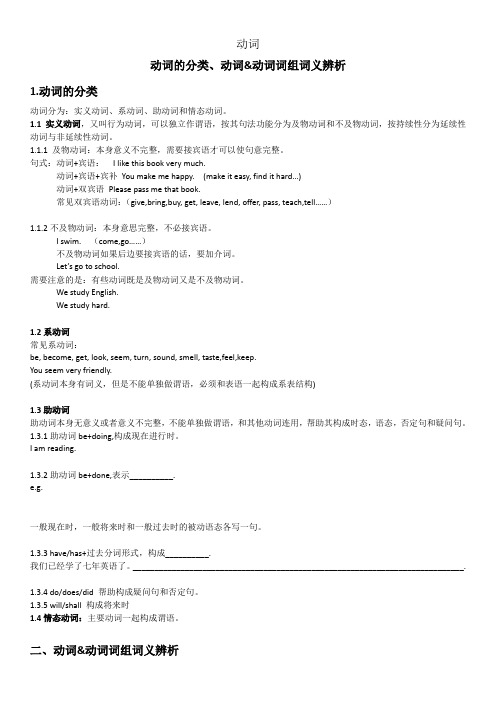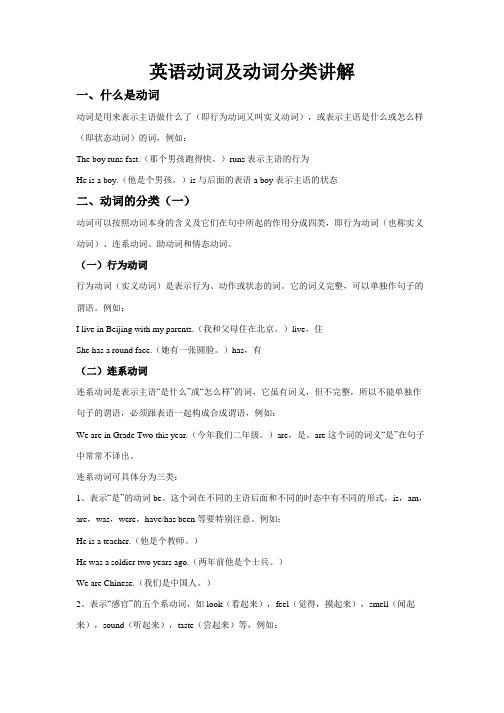动词分类和动词词组讲学稿
动词分类知识点

动词的分类、动词&动词词组词义辨析1.动词的分类动词分为:实义动词、系动词、助动词和情态动词。
1.1实义动词,又叫行为动词,可以独立作谓语,按其句法功能分为及物动词和不及物动词,按持续性分为延续性动词与非延续性动词。
1.1.1 及物动词:本身意义不完整,需要接宾语才可以使句意完整。
句式:动词+宾语:I like this book very much.动词+宾语+宾补You make me happy. (make it easy, find it hard…)动词+双宾语Please pass me that book.常见双宾语动词:(give,bring,buy, get, leave, lend, offer, pass, teach,tell……)1.1.2不及物动词:本身意思完整,不必接宾语。
I swim. (come,go……)不及物动词如果后边要接宾语的话,要加介词。
Let’s go to school.需要注意的是:有些动词既是及物动词又是不及物动词。
We study English.We study hard.1.2系动词常见系动词:be, become, get, look, seem, turn, sound, smell, taste,feel,keep.You seem very friendly.(系动词本身有词义,但是不能单独做谓语,必须和表语一起构成系表结构)1.3助动词助动词本身无意义或者意义不完整,不能单独做谓语,和其他动词连用,帮助其构成时态,语态,否定句和疑问句。
1.3.1助动词be+doing,构成现在进行时。
I am reading.1.3.2助动词be+done,表示__________.e.g.一般现在时,一般将来时和一般过去时的被动语态各写一句。
1.3.3 have/has+过去分词形式,构成__________.我们已经学了七年英语了。
动词的种类动词的种类共18页课件

1)状态系动词 用来表示主语状态,只有be一词,例如: He is a teacher(is与补足语一起说明主语的身份。) 2)持续系动词 用来表示主语继续或保持一种状况或态度,主要 有keep,rest, remain,.stay,lie, stand,例如 He always kept silent at meeting. This matter rests a mystery.此事仍是一个谜。 3)表像系动词 用来表示看起来像"这一概念,主要有sem, appear,look,例如: He looks tired.他看起来很累。 He seems(to be) very sad.他看起来很伤心
动词的种类
说明:同一动词有时可用作及物动词,有时可用 不及物动词。例如: She can dance and sing (sing在此用作不及物动词。) She can sing many English song (sing用作及物动词。) 4)根据是否受主语的人称和数的限制,可分两类 分别是:限定动词( Finite Verb)、非限定动词 ( Non-finite Verb)例如: She sings very well (sing曼主语She的限制,故用第三人称单教形 式 sings。) She wants to learn English well ( to learn不受主语she的限制,没有词形变化, 是非限定动询。)
5.2什么是助动词 1)协助主要动词构谓语动词词组的词叫助动词 ( Auxiliary verb)。被协助的动词称作主要动词 (MainⅤerb)。助动词自身没有词义,不可单独使 用,例如: He doesn“ t like English.( doesn't是助 动词,无词义;Iike是主要动词,有询义) 2)助动词协助主要动词完成以下功用,可以用来 a.表示时态,例如: He is singing. He has got married b.表示语态,例如: He was sent to England C.构成疑问句,例如: Do you like college life? Did you study english before you came here? d.与否定副词not合用,例如:Idon" t like hin e.加强语气, Do come to the party tomorrow evening He did know that.3)最常用的助动词有:be,have,
动词讲义

动词种类与基本形式一、动词的分类按照动词在句中的作用,英语动词可分为四类;实义动词,连系动词,助动词和情态动词。
1、实义动词(行为动词)实义动词(行为动词)说明动作或状态,能独立作谓语,可分为及物动词和不及物动词。
She types fast. 她打字速度很快。
He studies in this school.他在这所学校学习。
(1) 及物动词及物动词必须接宾语,才能有完整的意思,这可以有三种情况;①动词+宾语Her father enjoys warm tea very much in summer.②动词+间接宾语+直接宾语Did he give you a present yesterday? May I ask you a question?③动词+宾语+宾补They call her "Little Li" They elected Bush president.他们选布什当总(2) 不及物动词不及物动词本身有完整的意思其后不需要跟宾语。
例如:His mother works in a hospital.The sun rises in the east. 太阳从东方升起。
(3) 兼作及物动词和不及物动词的动词及物动词和不及物动词的分类不是绝对的,有些动词随使用场合不同而不同,既可作及物动词又可作不及物动词,有时动词的意义也发生变化。
如:The policeman stopped the car.(及物动词)警察叫那辆汽车停下。
The car stopped.(不及物动词)汽车停下了。
We began the meeting two minutes ago. (及物动词)两分钟前我们开始开会。
May I begin now?(不及物动词)我可以现在开始吗?注意:记住下面这些可带双宾语的动词buy, bring, build, cook, cut, draw, find, hand, get, leave, lend, make, offer,pay, pass, read, return, show, sell, tell, teach, write等。
四类动词(实义动词、系动词、助动词、情态动词)的用法讲解-高考英语语法总复习

四类动词(实义动词、系动词、助动词、情态动词)的用法讲义2022届高考英语语法总复习实义动词的用法实义动词的概念实义动词是表示动作或状态,有完整意义,能在句中独立作谓语的动词They eat a lot of potatoes.他们吃了大量土豆。
根据词尾是否接宾语实义动词可分为及物动词(vt.)和不及物动词( vi. )及物动词及物动词是指后面带有宾语的动词,其后要接宾语,意义才完整宾语通常由名词、代词、动词-mg形式、动词不定式等构成He always does his homework at home.他总是在家里做作业。
I have lunch at school every day.我每天在学校吃午饭。
用法:1、及物动词可用于被动语态中The work has been finished for two hours.这项工作已经完成两个小时了。
The cup was broken by my brother.茶杯被我弟弟打破了。
2、及物动词可以有直接宾语、间接宾语或复合宾语He passed me the ball.他把球传给我了。
Keep the classroom clean and tidy.保持室内干净、整洁。
注意:常见的能带双宾语的动词有:bring, buy, cook, draw, find, get, hand, leave, end make, offer. pass, pay, read, return, sell, show, each, tell write, etc.不及物动词不及物动词本身意思完整,其后无需跟宾语实例:He spoke at the meeting.他在会上发了言。
Don't look for an excuse.别找借口了。
注意:很多动词既可用作及物动词又可作不及物动词如何区别它们,就看它们后面是否直接接名词作宾语He studies English very hard.他非常努力地学习英语。
英语动词及动词分类讲解(打印版)

英语动词及动词分类讲解一、什么是动词动词是用来表示主语做什么了(即行为动词又叫实义动词),或表示主语是什么或怎么样(即状态动词)的词,例如:The boy runs fast.(那个男孩跑得快。
)runs表示主语的行为He is a boy.(他是个男孩。
)is与后面的表语a boy表示主语的状态二、动词的分类(一)动词可以按照动词本身的含义及它们在句中所起的作用分成四类,即行为动词(也称实义动词)、连系动词、助动词和情态动词。
(一)行为动词行为动词(实义动词)是表示行为、动作或状态的词。
它的词义完整,可以单独作句子的谓语。
例如:I live in Beijing with my parents.(我和父母住在北京。
)live,住She has a round face.(她有一张圆脸。
)has,有(二)连系动词连系动词是表示主语“是什么”或“怎么样”的词,它虽有词义,但不完整,所以不能单独作句子的谓语,必须跟表语一起构成合成谓语,例如:We are in Grade Two this year.(今年我们二年级。
)are,是。
are 这个词的词义“是”在句子中常常不译出。
连系动词可具体分为三类:1、表示“是”的动词be。
这个词在不同的主语后面和不同的时态中有不同的形式,is,am,are,was,were,have/has been等要特别注意。
例如:He is a teacher.(他是个教师。
)He was a soldier two years ago.(两年前他是个士兵。
)We are Chinese.(我们是中国人。
)2、表示“感官”的五个系动词,如look(看起来),feel(觉得,摸起来),smell(闻起来),sound(听起来),taste(尝起来)等,例如:She looked tired.(她看起来很疲劳。
)I feel ill.(我觉得不舒服。
)Cotton feels soft.(棉花摸起来很软。
动词分类及动词短语课件

3.must和have to (1)must 意为“必须,应该,一定,准是”,表示说话人认 为 有必要做某事,或命令、要求别人做某事以及对事物的肯 定推测。如: He must be working in his office. 他一定在办公室工作。 (2)must 和 have to 的区别: must 表示说话人的主观意 愿;have to 表示客观需要。如: I must do my homework first. 我必须首先做家庭作业。 It is raining hard outside. I have to stay at home. 外面雨下得很大。我不得不待在家里。
3 情态动词 情态动词表示说话人的语气、情态,无人称和数的变化。 情态动词有自己的词汇意思,但不能独立作谓语,其后须跟动 词原形。使用频率较高的情态动词有can(could), may(might), must, need, shall(should), will(would)及半情态动词have to, had better。
( A )7. Don't forget to take your bag when you ________ the bus. A. get off B. take off C. turn off D. put off [解析] get off意为“下(车)”; take off意为“脱下”; turn off意为“关上”;put off意为“推迟”。句意: 当你下车时不要忘记带上你的包。故选A。 ( D )8. Her sister________ a taxi driver. Now she works for a charity. A. is used to be B. were used to being C. is used to being D.used to be
英语动词的分类与讲解演示教学
英语动词的分类与讲解英语动词的种类◆提示:以下动词的分类并没有绝对的标准。
有的分类只是为了更好地学习英语动词、掌握动词的用法和搭配,以及更好地学好与动词有关的语法。
◆切记:有些动词作不同的意义解释时可以分属于不同种类的动词。
因此,我们要特别注意一词多义现象。
1.实义动词实义动词是指具有完整意义,可以单独作谓语的动词,主要表示主语的动作、状态和品质。
实义动词也可与助动词相结合表示更加复杂的动词意义。
实义动词主要包括及物动词和不及物动词两类。
(1)不及物动词不及物动词指的是后面不能跟宾语的动词。
在英语中大多数动词既可作及物动词,又可作不及物动词。
纯不及物动词很少。
常见的不及物动词有:apologize道歉 appear出现arrive到达come来go去run跑walk走die死 fall掉flow流淌happen发生rise升起、站起stay呆、留sit坐lie躺stand站cry哭swim游泳e.g.Let's go. 我们走吧!(2)及物动词能跟宾语的动词称为及物动词。
可分为跟单宾语的及物动词、跟双宾语的及物动词、跟复合结构的及物动词等。
①常见的只跟单宾语的及物动词accept接受 borrow借bury埋cover覆盖defeat挫败discover发现enjoy喜欢excite使激动interest使感兴趣please使高兴 put放 worry担心surprise使凉讶 forget忘记guess猜测love热爱use运用e.g.Don’t forget to wake me up at six tomorrow morning.别忘了明天早晨六点叫醒我。
You can borrow one book at a time from the library.在图书馆一次只能借一本书。
②常见的跟双宾语的及物动词A.指人的间接宾语在指物的直接宾语后面需加to的动词:bring带来give给hand递pass递 pay付款post寄promise答应read读 return返还sell卖show表现teach教tell告诉wish祝愿offer提供e.g.I returned him the storybook.(可变为I returned the storybook to him.)我已把故事书还给他了。
英语动词分类ppt课件
1. 动词+宾语(V.+O.) Jane likes music very much.
2. 动词+直接宾语+间接宾语(V.+O.+O.) She gave me a book.
3. 动词+宾语+补语(V.+O.+OC.) I found the book interesting.
经营者提供商品或者服务有欺诈行为 的,应 当按照 消费者 的要求 增加赔 偿其受 到的损 失,增 加赔偿 的金额 为消费 者购买 商品的 价款或 接受服 务的费 用
连系动词常用结构 P451
1.+形容词 2. +名词、代词 3. +副词╳ 连系动词后面一般不加副词。 4. +分词 5. +介词短语
She looked forward every spring to_D____ 经营者提供商品或者服务有欺诈行为的,应当按照消费者的要求增加赔偿其受到的损失,增加赔偿的金额为消费者购买商品的价款或接受服务的费用
flower-lined garden.
A. visit
B. paying a visit
6、一般只接不定式作宾语的词/词组
decide, expect, hope, wish, order, refuse, promise, pretend, agree, seem, attempt, fail, offer, happen, warn, afford
经营者提供商品或者服务有欺诈行为 的,应 当按照 消费者 的要求 增加赔 偿其受 到的损 失,增 加赔偿 的金额 为消费 者购买 商品的 价款或 接受服 务的费 用
3、使役动词/感官动词类:
一.动词的分类课件
4. ---What are you _ta__lk_i_n_g__ about ?
--- A film.
精品文档
3.look , see , read 与watch
1. Look =vi“看”,强调看的动
作+介词+n.
2. See =vt“看见”,强调看的结果
yesterday afternoon.
A. got
♣B. got to
C. reached to
D. reached in
精品文档
5.There be 与have
There be “某地有某人(物) . ●There is a book and two rulers on
the desk.
have指某物或某人自身拥有. ●I have an old computer.
精品文档
经典例析
1. ___A____! Someone is singing in the
next room.
A. Listen
B. Listen to
C. Hear
D. Hear of
2.Though he __C_ the teacher carefully,
he couldn’t ____ anything. A. listened to ; listen B. heard ;hear C. listened to ; hear精品文档 D. listened ; hear
一.动词的分类
精品文档
动词:表示动作/状态的词
Vi不及物
作谓语 Vt及物+n.性
动词 分类1
V系+adj. 性
动词和动词词组 ppt课件
My wife doesn’t know Russian
Do you agree with me?
2.do用来加强语气,起强调作用 You do look well
3.do用作代词 ---Do you like Beijing? ---Yes,I do (do代替like Beijing)
Examples: 1. It may snow before nightfall.
2. Would you let me use your pen for a minute?
3.If she became a movie star, she could afford a new home.
注意:情态动词过去时形式并不一定就表示过去时间 情态动词不能叠加使用,其后接的是动词原形
第10讲
动词和动词词组
动词分类(一)
1,按其在动词词组中所起的作用分:主动词和助动词
{主动词: 又叫实义动词,能独立作句子谓语成分 简单动词词组 复杂动词词组 基本助动词:be,do,have
{ 助动词
情态助动词 can,could,may,might,will,would,shall,should,need, must,dare,dared,ought to,used to
半助动词:have to,seem to,be about to,be due to, be going to ,be meant to,be meant to,be supposed to等.
Examples: 1.The workers received a raise last year.
2.They have been taking music lessons.
- 1、下载文档前请自行甄别文档内容的完整性,平台不提供额外的编辑、内容补充、找答案等附加服务。
- 2、"仅部分预览"的文档,不可在线预览部分如存在完整性等问题,可反馈申请退款(可完整预览的文档不适用该条件!)。
- 3、如文档侵犯您的权益,请联系客服反馈,我们会尽快为您处理(人工客服工作时间:9:00-18:30)。
动词分类和动词词组动词是英语中最为重要,变化形式最多的一类词。
动词分类简表动词词组就是由动词和另外一个或几个词组成的词组(短语)。
例如:look after______________ write down_______________ care about_____________ laugh at _____________catch up with ___________pay attention to______________ belong to_______________ get on____________________ have a look_____________I. 请从下列句子中找出动词并说出该动词的类型1.There’s enough time for you to go to theairport.________________________________________2.I spent 5,000 yuan on this iPhone. ________________________________________3.The little girl offered her seat to an old man on the bus._______________________________4.We can’t do listening practice today, for Miss Zhao’s tape-recorder doesn’t work.__________________________________________5.I called you, but nobody answered. __________________________________6.Jack, could you help me find out when the plane will take off?__________________________________________7.More and more people taking part in dangerous sports activities.__________________________________________8.Don’t be afraid of new words. ________________________________9.Would you please take care of my baby while I’m cooking?_______________________________10.The baby is sleeping. Please turn down the radio.__________________________________II.单项选择1.Some of my friends eat with their eyes. They prefer to order what ________ nice.A. feelsB. smellsC. looksD. tastes2. --_________I swim here?--I’m sorry. Children ________ swim alone here.A. Must; can’tB. May; mustC. Can; mustn’tD. Can’t; can3. He failed in the math test and looks sad. Let’s __________.A. put him upB. set him upC. cheer him upD. clean him up4. –What smells terrible, Ted?--I’m sorry, I’ll __________ my shoes and wash them at once.A. take awayB. put awayC. move awayD. get away5. –Which hobby do you think _______ the least time?--Collecting stamps.A. takes upB. tidies upC. gives upD. make up6. Don’t ________ so often. It’s bad for your health.A. get upB. stay upC. look upD. come up7. –What’s on the desk?--There_____ some books.A. beB. areC. isD. am8.________ you please help me with my math?A. ShouldB. WouldC. ShallD. Need9. Don’t_______, my children. Keep working hard and you will win the match.--Thank you, Mr. Zhang. We’ll try our best.A. put upB. call upC. set upD. give up10. I’m not sure whether I can hold a party in the open air, because it__________ the weather.A. stands forB. depends onC. lives onD. agree withIII.完形填空When I had something difficult to do,I used to ask my mother for help. But she always said, “Do it yourself,dear.” I was not 11 at all. I thought she was the 12 mother in the world!For example,one day,I decided to 13 some friends to my home. My bedroom was not in order. Books were everywhere. And I didn’t make the bed. I asked my 14 to help me clean it, 15 she still said,“Do it yourself, girl.”Because of my “lazy mother”,I have to 16 my clothes and clean my room. I have to help my parents 17 . I even have to go to the dentist by myself. It is really hard for me to do everything well,but I have learned 18 .As time goes by,I understand my mother. She makes me clever and diligent (勤奋的). 19 a great mother! A 20 mother is worth(等值于)one hundred teachers! Don’t you think so?11. A. old B. glad C. thin12. A. tallest B. most foolish C. laziest13. A. leave B. invite C. visit14. A. mother B. father C. brother15. A. or B. when C. but16. A. wash B. lead C. knock17. A. do housework B. go swimming C. go camping 18. A. on show B. by mistake C. a lot19. A. Which B. What C. Who20. A. young B. good C. happyIV. 请将下列单词连成句子1. then, I can’t, he said, you, understand,__________________________________________________2. but, an English dictionary, took out, the man,____________________________________________________3. she said, the hospital, you, can, the way to, tell me,____________________________________________________4. lost, way, her, she,____________________________________________________5. saw, she, near, a bus stop, a man,____________________________________________________6. the man, know, didn’t, English, because, came from, he, Germany____________________________________________________7. looked up, words, he, some,____________________________________________________8. London, last week, went to, Mrs. Black____________________________________________________请将上面的句子按正确的顺序排列________________________________________________________________III. 请将这些句子连成一段话________________________________________________________________________ ______________________________________________________________________________ ______________________________________________________________________________ ______________________________________________________________________________ ______________________________________________________________________________ ______________________________________________________________________________。
